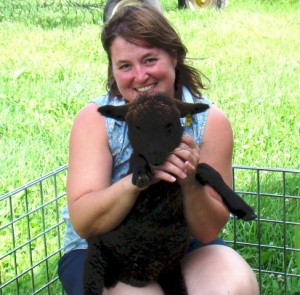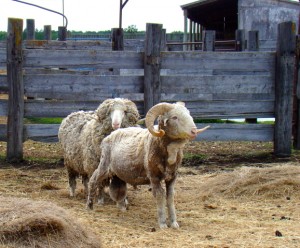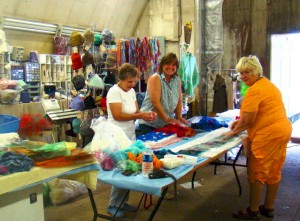Article appeared in the Aug 11, 2011 issue of the Interlake spectator…

Kim and Joe Streker, live near Sandridge, north of Inwood on a 1,000 acre former cattle operation that they purchased in June, 2006. There, they raise Merino sheep, a breed known for its exceptionally soft fibre, and interbreed them with other sheep to obtain a variety of coloured wools for crafting beautiful woven blankets, and felted and knitted products.
The couple began with only 10 sheep, some of which they bred, and some which were kept as pets. Since then, the operation has grown to over 150 sheep, each sheared by hand, and used mainly for their fibre.
Prior to their move the Strekers lived in Binbrook, Ont. They came to Manitoba in search of a new way of life, having left behind careers as college professors: Joe taught Industrial Automation, and specialized in power plant control systems, while Kim taught Computer Software courses. However, the couple has always had farming in their blood.
“We had sheep before we came here. I used to farm a lot of acres, from cash crops to hay. Then we had horses,” said Joe. “In 2007 we had 300 sheep by then, and we bought all the machines.”
A large Quonset on sits unobtrusively in the yard site, where numerous specialized machines are housed: 3 looms, 3-shafts up to 16- shafts for complex weaving designs, a carding machine, a pin drafter, a spinner, and a cone-winding machine, all satisfying Joe’s penchant for machinery.
“We did start with the traditional spinning wheel—bought in 2003,” said Kim. Now most of the work is automated, except for hand dying which is done before the wool is spun.
The carding machine picks up the sheared wool and grabs the fibres up through a series of rollers. Once carded, the wool is put into the pin drafter which makes beautiful coils of soft wool. Some of the coils are set aside for spinners who may purchase the coils for 7 cents per gram. Most of the coils, however, are moved along to the next machine, a spinner, which offers a choice of 6 spindles for different diameters of wool, from very fine treads to thick yarn. These are formed into skeins for sale to knitters for $9.95 per 100 grams, or it makes its way to the final step, at the cone-winding machine
Joe mastered the loom without difficulty, as well the art of sheep-shearing, which he can now do in six minutes flat. He weaves the blankets, while Kim knits and felts a wide assortment of fashionable clothes and accessories.
“It was easy for me. I have to work at playing good golf, but this was just natural for me. It was just simple,” said Joe.
The Strekers are like any other farmers in the area. They contend with flooding, as well as the loss of about 20 sheep per year to coyotes. They sell surplus hay, and rent out land for cattle grazing. Added to their fibre creations, the couple manages to eek out a living together.
“For the soul, it’s definitely worth it. It’s not worth it for the pocket book,” said Joe,
The Streker’s, farm, called “Sheeples”, (because the sheep think they are people) is open to the public for tours. Visitors can drop in by appointment or come for the second annual Open Farm Day, to be held on Sept. 18 this year.
“Last year we had about 500 visitors…small family groups, tour bus loads of people, hosted,” said Kim. “In the fall, people come to buy clothes.”
Kim also makes it out to a handful of venues—the Icelandic Festival, Scattered Seeds, and sometimes in malls. The Strekers sell their goods from their home, and at Serendipity, on Academy Rd. in Winnipeg.
Kim is a member of the Hand Spinners and Weavers Guild, and a regular participant in the Monday afternoon knitting group in Teulon Kim frequently gives talks and presentations on variety of topics, including value added farming, and the historical aspects of knitting and weaving.
Sweaters sell for $75-$400; socks, $30-$70; mitts, $20-$45; hats, $15-$50; scares, $12-$50. Other clothing items are available, as well as hand-woven blankets, and, on occasion, rugs.
“We also do a whole line of purses, with silk linings and crystals,” said Kim.





